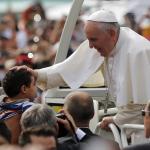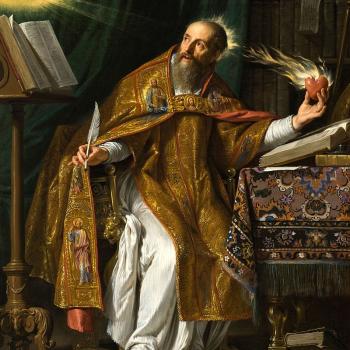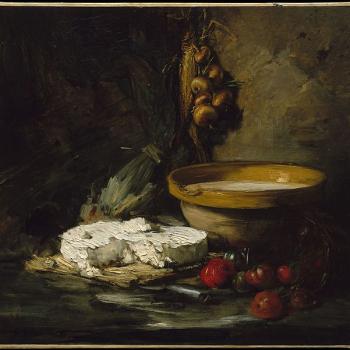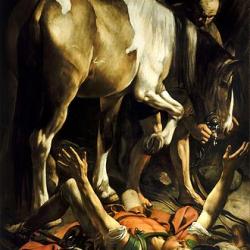I think it is a good thing to see what my fellow Catholics are up to in the world of online media. But keeping up with all the various writes of the church can be a daunting task. There are so many different Catholics with something to say in sight, sound, and written words that it is nigh improbable to keep up with all the interesting things out there to watch, listen to and read. You can’t read it all but you can read some. Here is a sum of some of the things your fellow baptized Catholics have sat at a computer to compose and write or produce and put on Youtube.
I tried to find interesting spiritual thoughts and insights from various types of Catholics from different theological outlooks and attempted to stay away from controversial and condemning points of view.
Also there may be a few non-Catholic related material added just because I wanted to share them cause there worth sharing.
Welcome to Writing Write Now 2024 # 1
Art as an Argument for God
As Benedict XVI reminds us, “the only really effective apologia for Christianity comes down to two arguments, namely the saints the Church has produced and the art which has grown in her womb.” It was, he added, the “splendor of holiness and art” which bore the best witness to the Lord.
These six composers might not have been saints, but the splendor of their voices bears a living witness to the Lord. Well may we hope and pray that their songs may continue to be sung and that they may be heard more clearly amid the din and discord of our modern world.
Joseph Pearce A Song of Praise to Six Unsung Singers of Sacred Music(January 10, 2024) Crisis Magazine
Education
Someone unfamiliar with the liberal arts ethos might be surprised at the number of alumni who go on to the trades. After a pristine education in the intellectual and artistic traditions of the West, why become a carpenter or plumber? At Wyoming Catholic, at least, I believe this stems from the love of the real world inspired by John Senior, and a deep appreciation for caring for the world which is, enjoying the good things the Giver has given us as “small-s sacraments” of His presence. From an appreciation of creation arises a knowledge of oneself and therefore of the common good, and an impetus to build up society accordingly.
Julian Kwasniewski What Can You Do with a Liberal Arts Degree? (January 10, 2024) OnePeterFive
God the Father
God is not merely a good idea, nor is he a far-off deity seated on a throne shooting lightning from his fingertips. He is Father. He is close. He sees “in secret” (Matthew 6:4), not to catch his children in wrongdoing, but rather with the gaze of love. He is tender and stable, and before him, our identity is solidified. As St. Francis said, “I am who I am in the eyes of God, nothing more and nothing less.”
Father Dave Pivonka My Father’s Father: Looking Into the Depth of God’s Love For You (January 8, 2024) National Catholic Register (ncregister.com)
Incarnation and Created Things
The Fathers held that the deepest enigmas of our cosmos are unlocked only in the light of Christ’s death and resurrection. St. Maximus the Confessor thus described the Incarnation as the key to understanding enigmatic passages in both of God’s “books.” Indeed, in the following text he goes so far as to affirm that the mystery of the cross and resurrection lies at the heart of all things:
The mystery of the Incarnation of the Logos is the key to all the arcane symbolism and typology of the Scriptures, and in addition gives us knowledge of created things, both visible and intelligible. He who apprehends the mystery of the cross and the burial apprehends the inward essences of created things; while he who is initiated into the inexpressible power of the resurrection apprehends the purpose for which God first established everything..
Matthew J. Ramage, Ph.D.The Paschal Mystery proclaimed in creation (January 6, 2024) Catholic World Report
Irony
The Gospels tell us that, in response to various circumstances, Jesus rejoiced, wept, demonstrated anger and was impatient with his disciples.Of all the divine estimations of earthly situations, irony might be the one that most saddens or delights God. Clearly, tragedy is worse: Catastrophes, wars, plagues … God is intensely present to the sufferers in all those events, even though, like Jesus on the cross, they often cry out, feeling abandoned. But the ironic things, the things that happen in the opposite way from the expected, can be the source of profound disappointment or delight. Matthew’s story of the Magi is full of irony.
MARY M. MCGLONE The Epiphany of the Lord: Wandering in wonder (January 6, 2024) National Catholic Reporter (ncronline.org)
Prayer, Fasting and Almsgiving
Further, we should embrace prayer, fasting and almsgiving because they are graces. These practices are grounded in the law and the prophets; Christ taught these practices, and in his self-gift, gave us a model of grace. We should always be careful of pride. But in so doing, we should not flee the practices that Christ gifted us in the tradition. In prayer, we rediscover our need for God. In fasting, we rediscover that we are perfected in our weakness. And in almsgiving, we rediscover that in giving of ourselves we receive.
Terence Sweeney Fasting, praying and working out: What ‘Exodus 90’ gets right—and wrong—about asceticism for men (January 09, 2024) America Magazine
New Year’s Resolutions
I’m not saying that attending more Masses or praying additional Rosaries in 2024 will culminate in shedding a few extra pounds or becoming the efficiency guru we’ve always dreamed we could be (though it certainly couldn’t hurt!). Rather, I am suggesting that this year — especially for those of us whose resolutions have already gone sideways — let’s remember to make space for God to do greater works within and through us.
It’s still early in 2024. If you haven’t done so, make your resolutions. If you’re already feeling like a failure, tomorrow is another day. Begin again and invite God into it. Let us strive to be better in all ways, but let’s not merely settle for resolutions when God offers revival. Our grit is good, but God’s grace is better.
Patience
Cyprian’s advice is simple, really. In order to become more patient, we first have to be convinced about how many benefits there are to it. Life is full of obstacles, and patience is the key to remaining peaceful and happy as we work through them. Cyprian talks about how the drudgery of work, bad health, and evil people can all entice us to act rashly. We often react quickly and end up hurting people we love or making ill-considered decisions we later regret.
Cyprian says to remember the times others have been patient with us and how much it meant to us. He especially mentions how God is patient with our mistakes, but we can also consider other people. I know that I appreciate people who’ve given me this gift, and I hope to be able to do the same for others.
As Cyprian puts it, “Wait for each other.”
Fr. Michael Rennier –Struggling with patience? This impatient saint can help you (published on 09/10/17 – updated on 01/10/24 (aleteia.org)
Prayer
Sometimes prayer can become laborious or tedious. It’s human nature to want novelty. We don’t like to become bored. We find peace and fulfillment in the unchanging-ness of some things, while we want variety in others. The God who loves variety so much that he made multiple varieties of any single thing he created is the God who built this into us.
So if your prayer life begins to bore you, modify the routine. The Holy Spirit guides prayer. He will guide you to some routines that may never change, and some that He wills to change. Know the difference. Ask the Holy Virgin to help you.
Advice for when it’s hard to pray (January 7, 2024) The Catholic Adventurer
Suffering With Others
In anxiety and tears, Jesus embodies the humanity that we all experience. His suffering takes places on a plane of immanence shared as much by philosophers as by theologians. Hence Falque’s maxim: “Nothing speaks or is spoken without passing through humankind, in that God was made man.” When Jesus falls to the ground in the garden, he completes his commitment to dwell on earth. Falque wonders if Christians today can live up to this achievement, or whether Christianity has become an instrument to separate our anxious lives from those of our neighbors, who share the same flesh. The hard lesson of Gethsemane is that I must relinquish myself to this world, accept my finitude, without seeking a subtle escape belonging only to Christians. Rather, I find transcendence only in the face of the other who shares finitude with me. Paradoxically, by abandoning oneself to the loss of selfhood in death, one can “break open the circle of one’s own isolation.”
David Albertson Fraternity in Finitude (January 10, 2024) Commonweal Magazine
Wasting Time
So I’ve managed to make friends with stillness and no longer confuse doing nothing with laziness. “Wasting time with God” is a down payment on eternity after all, a temporal trust walk that suggests we believe God will supply all the time we need to get all that’s needed done.
Hoarding our mortal time as so precious that we can’t waste it on God in stillness is an indication that we don’t really believe all the stuff we pretend to profess. Which is why, on those many occasions in which I find myself standing in the middle of a room, torn between separately screaming tasks and unsure which direction to move, I sometimes hear an inner voice shout: “Sit down!” And I do. The busier you are, the more nothing you need to be doing. This is the only wisdom I have to impart on the subject of discernment: Do more nothing.
God wants you to waste your time (January 4, 2024) U.S. Catholic (uscatholic.org)
Who Do You Say Jesus Is?
Once we admit that Jesus is the Christ, the son of the living God, our daily lives must change dramatically. Because if he is who he says he is and if I plan to live with him in eternity, well … I better orient every remaining second of this earthly life to His service.
Perhaps this is the very first question our Lord will ask of us when we stand before him on Judgment Day: “Who do you say that I am?”
Today would be a very good day to start pondering that question.
·But who do you say that I am? (JANUARY 4, 2024) Where Peter Is













